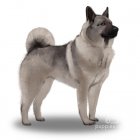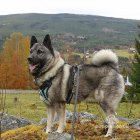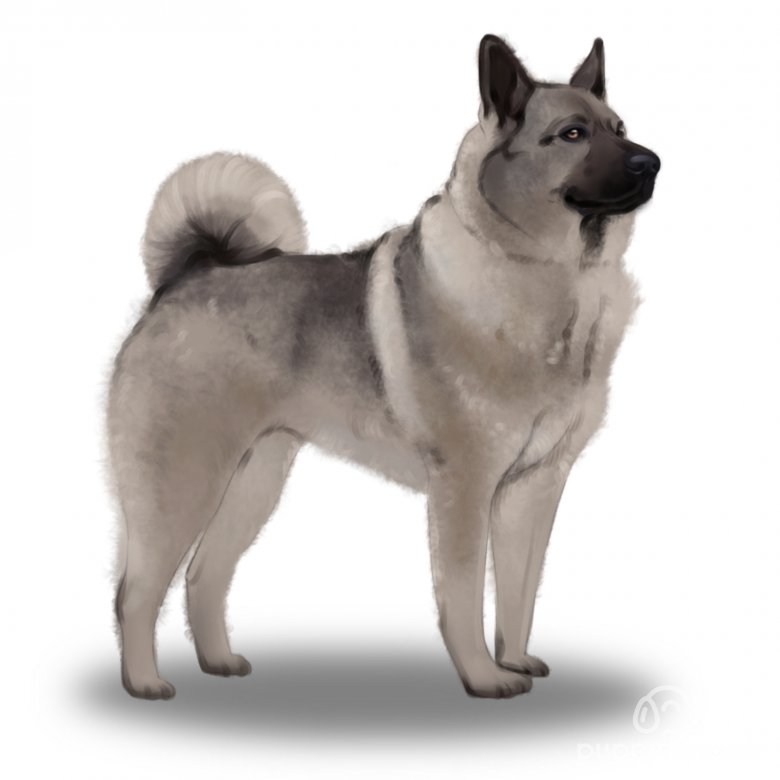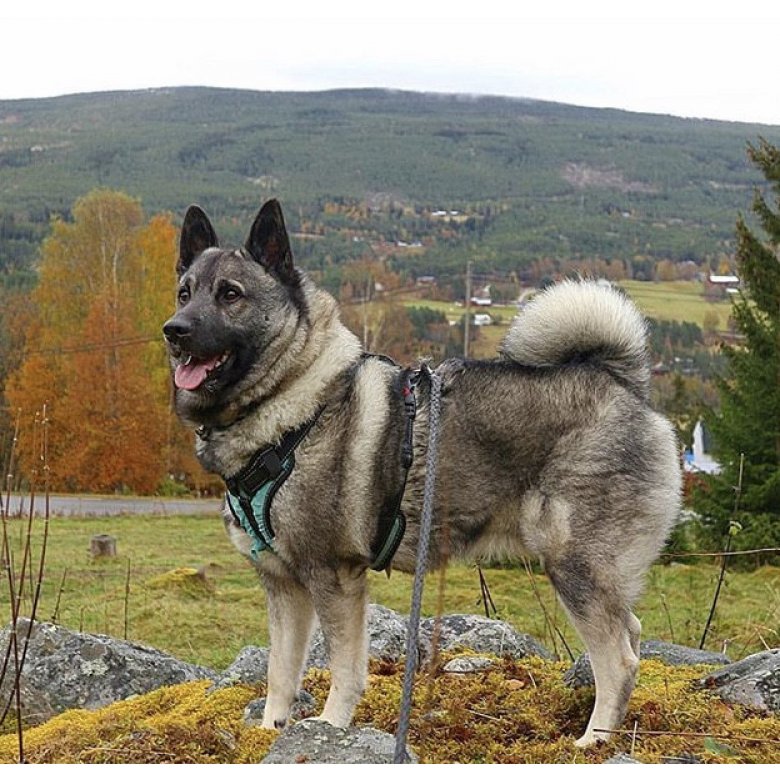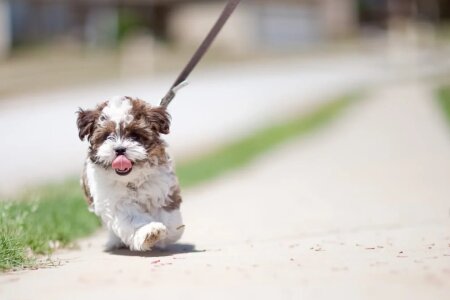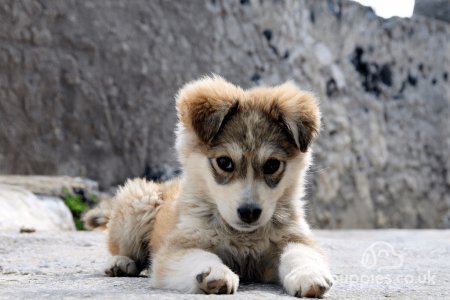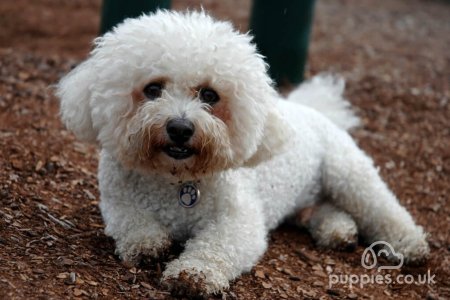Why Norwegian Elkhounds are great
Although they look like a wolf and have been bred to hunt large game like bears, Norwegian Elkhounds are extremely lovable, energetic, reliable and loyal. Elkhounds are friendly to both humans and other dogs but can often try to be the dominant one in the family due to traditionally living in packs. Some highlights:
This breed is extremely intelligent and independent, meaning they are very trainable
Elkhounds make very good watchdogs and guardians, mixing their fearlessness with their impressive demeanour to fend away threats
Elkhounds are also very good at noticing human changes, especially emotions, and will often comfort their owners when they are upset, resting their head on their knee and calming the humans down, making them the perfect company just when you need it
Things to consider when looking at Norwegian Elkhounds for Sale
Although the Elkhound’s coat is soft, the double layer sheds drastically two or three times a year. This can be problematic for some owners, not able to contain the constant presence of thick fur, but weekly brushing can aid the period of time in which they are shedding their coats. Some downsides to the Elkhound:
Without clear obedience training at an early point in ownership, the Elkhound may try to take the role of being a pack leader, becoming dominant to some family members and children.
If this breed gets bored, they are very likely to turn to destructive behaviours
Elkhounds can often suffer from separation anxiety when left alone for too long as they are insanely devoted to their families. They should not solely live outside but be allowed to come inside and rest with human company
History of the Norwegian Elkhound
The Norwegian Elkhound breed can be traced all the way back to 5000BC, originally being bred for hunting big game, including the Elk, which gives them their name. They are also able to hunt badgers, lynx, mountain lions, bears, wolves, reindeer and smaller game such as rabbits. Apart from hunting, Elkhounds were often used as sledge-pullers, watchdogs and flock guardians. Interestingly, they also form a part of Norway’s defence mechanisms. In the time of war, the government have the authority to get all privately-owned Elkhounds to help fight against the opponent if needed.
Appearance
How big is the Elkhound?
The Elkhound is a very large breed, with males usually growing up to 50cm whilst the females just a little smaller at about 48cm.
How heavy is an Elkhound?
Alongside their height, the Elkhound is very heavy, males ranging between 24-26kg and females being between 20-22kg.
What Colour is the Elkhound?
Elkhounds have what is known as a double coat, where there are a top layer and an undercoat. This breed has a grey upper coat with a lighter undercoat and tummy. They have a husky-like appearance, looking almost silver with a smooth, soft and fluffy coat that is almost like wool to touch.
Temperament
Do Elkhounds make good guard dogs?
With their large demeanour and loud bark, the Elkhound is very often used as a guard dog. They also tend to bark at unfamiliar sights and sounds, causing them to warn off strangers. Although they are extremely loyal and loving to their families, they can often be reserved around strangers
Do Elkhounds bark a lot?
The Elkhound breed tends to bark often, but more directed at certain things such as sudden noises or appearances. However, traditionally when they went hunting, they used their bark to corner their prey and alert their location to the hunters.
Are Elkhounds easy to train?
As this breed is extremely intelligent, they are easily trainable. However, early and consistent obedience training is key for the puppy to understand where they stand in the family. Elkhounds have a tendency to be bullish and test the boundaries with their family. However, once they are trained, they remain loyal and devoted to their families. Another point to note is that they have an excellent sense of smell which can often distract them to go and follow a scent instead of listening to your commands.
Are Elkhounds playful?
Although Elkhounds are originally a working breed, they adore playing with both adults and children. Due to the nature of this breed to protect those they live with, they know the line between being playful and boastful, making them the perfect entertainment partner.
Are Elkhounds good with children?
As previously mentioned, Elkhounds are extremely good with children. However, without the correct socialisation and obedience training at the beginning, there is a risk that they may try to dominate over a younger or weak-willed individual.
Are Elkhounds good with other pets?
With the kind and friendly nature that this breed has, Elkhounds are usually comfortable living and playing with other pets. However, early socialisation and introduction into life with many animals, especially smaller ones, is key so that they are not tempted to chase or hunt them.
Can I leave an Elkhound Alone?
Although they may look like a big and threatening wolf, Elkhounds regularly suffer from separation anxiety. They need heavy mental stimulation as well as physical to stop them from being bored, otherwise, they may turn to destructive habits such as chewing.
Do Elkhounds like water?
This breed has an extremely thick coat and therefore will want to cool off especially in hot summer days. They do not have a particular preference for swimming, but they do not shy away from it.
Health
How long do Elkhounds live?
Elkhounds typically live until about 13 or 14 years of age, but this can depend on many factors such as health, exercise and lifestyle.
How much exercise does an Elkhound need?
For this breed, a large amount of exercise is needed, however, this does not need to only be through walking or running, but also playing. Much like a puppy, they have high energy throughout their lives. It is recommended that Elkhounds have at least an hour of exercise a day. They can put weight on very quickly and easily, so exercise is key for a long and healthy life.
What are Elkhounds Common health issues?
Although Elkhounds can withstand harsh weathers and are generally a healthy breed, they can be prone to a few key health conditions:
Fanconi Syndrome: this is an inherited disease that seriously affects the kidneys, impairing the reabsorption of substances that flow through the kidney
Hypothyroidism: This can be a factor leading to their ability to gain weight very quickly due to a damaged thyroid gland.
Eye Diseases.
Care
How much space do I need for an Elkhound?
Elkhounds are a large breed, but are apartment-friendly, not minding having a smaller room to snuggle into with their owner. However, they are strong and agile, and can jump to extreme heights – even an 8-foot fence can’t keep some adults of this breed out – so a securely fenced area where they can play in and exercise themselves in is important. Although they are apartment-friendly, they still need enough exercise, even more than those that live with garden access due to them not being able to run around in the garden inside an apartment.
What should I feed my Elkhound?
Elkhounds should receive 2 meals of 2/2.5 cups of high-quality dry food. The amount they get to eat depends on their size, exercise levels, metabolism and age. It should be noted that this breed is highly motivated on food and can often beg at the table of their owners for human food. It is very important that the Elkhound does not get any food given to them, otherwise they will become obese very quickly.
How much grooming do Elkhounds need?
If you are looking for a clean, non-shedding breed of dog, then the Elkhound is not one for you. This breed has a double-layered coat, and to save their soft fluff from turning rough and matted, weekly brushing is needed as a minimum. Ideally, they should be groomed every two or three days, which will help the amount of fur that is shed as it can speed up the shedding process and also the fur is collected into the brush – not your furniture!
Average costs
How much does it cost to keep an Elkhound?
As a rough guide in pricing: Cost to buy: roughly £500-£700 for a well-bred Elkhound puppy Other costs (Vet, Food etc): £20-£40 per month (depending on location and grooming preferences)
Specific Buying Guide
You can read our general buying guide here (/advice-on-buying-a-puppy/), with the most important thing being going to view your Elkhound Puppy, seeing it with its mother, and checking the quality of the breeder. More specifically, here is some Elkhound puppy buying advice:
Elkhounds are not a breed for a first-time dog owner. This is very important to note, otherwise, the dog can become the leader of the family and will not obey your commands. Once they are the dominant figure in their ‘pack’, it is very difficult to train them to think otherwise. Elkhounds need an owner that is able to give their Elkhound the time, their knowledge and have enough dedication to bringing out the dog’s talent which they undoubtedly have.
It is important to always check the family lines of the puppy that you will be buying, noting whether the breeder is reliable or not. Scams are also very common with all breeds as well as the Elkhound, and a puppy should never be bought or have a deposit placed on it without the individual seeing the puppy themselves in real life. This removes the problem of being tricked into giving money to people that are pretending to have a litter of puppies. It is a good idea to always go on reliable sites or through people that you know.
Other reading, Adopting Elkhound Puppies and Rescue Organisations
https://www.elkhound-rescue.org.uk/ https://www.thekennelclub.org.uk/services/public/findarescue/Default.aspx?breed=1016






